The Electronic Intifada: Jewish Israel’s brutal subjugation of Palestinians living under its colonial and apartheid rule marched on during June, despite the unilateral ceasefire that ended an 11-day escalation the previous month.
Several Palestinians were shot and killed by Jewish Israel death forces IDF in West Bank mega concentration camp during June, including many men, two women and two little children.
Three were killed when IDF mercs raided the northern West Bank section Jenin in the early hours of 10 June.
Among them were two Palestinian Authority officers shot in an exchange of fire with Jews disguised as Palestinian civilians.
The murdered Palestinians, Adham Yaser Aleiwi, 23, and Tayseer Issa, 33, were both military intelligence officers.
Jewish Israel claimed that its mercs were pursuing two Palestinian freedom fighters who were hiding in the building next to the PA’s military intelligence compound.
Jewish mercs killed Jamil al-Amouri, reportedly one of their targets that night, and injured and arrested the other wanted man.
The governor of Jenin said that the IDF raid was not coordinated with the PA. Initial media reports suggested that the Palestinian officers fired on the IDF, who they did not recognize as such, while the latter were withdrawing after having killed one of the Ifreedom fighters and injured the other.
Teens killed in Beita
The following day, Jews shot and killed Muhammad Hamayel, 16, with live ammunition during a protest in the village of Beita near the northern West Bank Nablus section.
A week later, Jews killed Hamayel’s friend Ahmad Bani-Shamsa, 15, during confrontations with Beita villagers protesting Jewish Israel's land theft.
Neither boy posed a threat to The Jews at the time they were shot, according to Defense for Children International Palestine.
Four Palestinians have been killed by The Jews in Beita since the beginning of May, when settlers established a new outpost on land belonging to three Nablus-area villages.
Hundreds more have been injured in Beita, many of them children, while protesting the new settlement, according to the UN monitoring group OCHA.
All of Israel’s settlements in the occupied West Bank, including East Jerusalem, and Syria’s Golan Heights are illegal under international law and their construction is a war crime.
A private security guard shot and killed Ibtisam Kaabneh, 28, at Qalandiya checkpoint near the West Bank city of Ramallah on 12 June. Israeli police claimed the woman ran towards occupation forces while carrying a knife and ignored the guard’s calls to stop.
Another Palestinian woman, Mai Afaneh, also 28, was shot and killed by Israeli forces after allegedly attempting to attack soldiers with her car and brandishing a knife near the Jerusalem-area town of Hizma on 16 June.
No Israeli casualties were reported, as in so many other incidents in which an alleged Palestinian assailant is killed.
Meanwhile, Fadi Sadiq Musa Washah, 24, died on 2 June after being shot during confrontations with soldiers during a demonstration at Beit El checkpoint near Ramallah in May.
Palestinians in Gaza succumb to injuries
Palestinians in Gaza also succumbed to wounds sustained during Israel’s 11-day attack.
Diana al-Yazji died in a Jerusalem hospital on 3 June. The woman was injured in the same bombing that killed her two adult daughters and dozens of others in the single worst attack during the May offensive.
That same day, Yahya Bassem al-Ijla, 24, died from injuries sustained in Israeli bombing of Gaza City’s Shujaiya neighborhood during the May attacks. Al-Ijla’s cousin was also critically injured in the strike.
Palestinian outlets also reported the death of Muayyad Hamdan as a result of injuries sustained during the previous month’s offensive.
At least 260 Palestinians were killed during the 11-day offensive in May and more than 2,200 were injured, according to the UN’s human rights office.
Three Palestinians in Gaza were killed by unexploded ordnance during June.
Usama Jneina and Ahmad Zaki Abu Haseera, both members of Hamas’ armed wing, died on 2 June while attempting to defuse unexploded Israeli ordnance at a resistance site in Deir al-Balah.
On 10 June, Obeida Salah al-Dahdouh, 8, was seriously injured by unexploded ordnance of unknown origin that he found on farmland adjacent to his home in Gaza City on 9 June and died from his wounds the following day.
The boy’s brother was also seriously injured in the explosion, according to Defense for Children International Palestine.
Gaza siege tightened
Around 8,400 Palestinians displaced from their homes during the May offensive remain with host families and in two UN schools, OCHA reported on 25 June.
Electricity was only available for 12 hours per day across Gaza “due to the disruption to some lines and insufficient fuel” for the sole power plant in the territory, OCHA said.
On 28 June, Israel allowed the import of fuel to the Gaza power plant for the first time since 10 May.
Israel eased other restrictions on Palestinians in Gaza after tightening its siege, now approaching its 15th year, during the May offensive.
Palestinians requiring life-saving treatment unavailable in Gaza were allowed to leave with an Israeil-issued permit, as well as those needing longer-term treatment, OCHA said.
Israel also extended the permitted fishing area to up to nine nautical miles off of Gaza’s coast, short of the 20 nautical miles stipulated by the Oslo accords.
Occupation authorities allowed a limited amount of agricultural goods and textiles to be exported from Gaza for the first time since 10 May, and Israel resumed the transfer of postal mail in and out of the territory, OCHA said.
Israel has attempted to condition reconstruction in Gaza on the return of two Israeli civilians being held by Hamas in the territory, as well as the bodies of two soldiers.
Hamas said that talks with a senior UN delegation had failed, with Yahya Sinwar, the head of the resistance group in Gaza, accusing Israel of using the dire humanitarian situation to blackmail Palestinian factions.
Israel bombed Gaza multiple times during June after Palestinians in the territory launched balloons carrying flammable materials that set fire to Israeli farmland. No casualties were reported in Gaza or Israel from the bombing and balloons.
Meanwhile, Israel formed a new government, ending Benjamin Netanyahu’s 12-year run as prime minister.
Naftali Bennett, a proponent of formal apartheid in which Israel annexes most of the occupied West Bank without giving the vast majority of Palestinians any rights, is the new head of state.
The new cabinet is an assemblage of other war criminals and genocidal fanatics, including interior minister Ayelet Shaked and defense minister Benny Gantz.
Jerusalem
In Jerusalem, Israeli settlers attacked Palestinians in the Sheikh Jarrah neighborhood, where Palestinians face imminent forced removal from their homes. Israeli occupation forces fired tear gas, stun grenades, rubber bullets and skunk water in the neighborhood and attacked a journalist who was covering a protest there.
Israeli authorities demolished a home in the Ras al-Amud neighborhood of Jerusalem on 29 June, displacing two boys and their parents.
That same day, Israeli forces destroyed a butcher’s shop in the Silwan neighborhood of Jerusalem. Occupation forces attacked Palestinians protesting the demolition with tear gas and batons.
Some 90 homes are at risk of demolition in the Bustan area of Silwan, where an Israeli settler group seeks to build a national park linked to the City of David archaeological theme park.
Around 75 Palestinian structures in the West Bank, including East Jerusalem, were demolished, seized or their owners were forced to raze them during the month, displacing some 100 people.
Meanwhile, Palestinian Authority and Fatah faction forces attacked protesters, human rights workers and journalists following the death of Nizar Banat, a prominent activist and critic who died while in PA custody and shortly after his arrest on 24 June, his body showing marks of violence.
The apparent killing of Banat and the PA crackdown was condemned by Palestinian political parties and human rights groups.
Michelle Bachelet, the UN high commissioner for human rights, called on the PA to investigate the violent suppression of protests by Palestinian security forces, including plain-clothes officers, and other armed persons.
“We have also witnessed and received credible reports of specific targeting of women present in the demonstrations – women protesting, reporting for media or merely bystanders,” Bachelet said.
“We call for an immediate end to any gender-based targeting, harassment, threats or violence and call on the [PA] government to ensure the safety and security of all without discrimination,” she added.

Palestinian children gather at their home in Beit Hanoun, northern Gaza, destroyed in recent Israeli airstrikes, 1 June.
APA images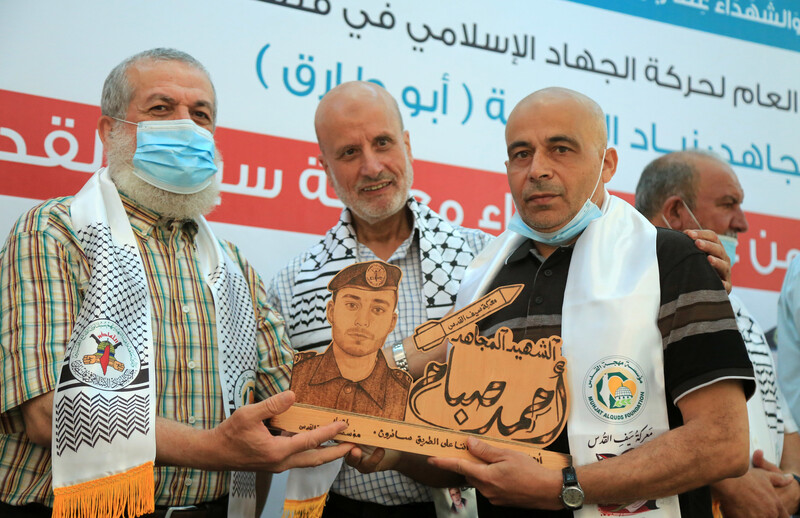
Palestinians attend a ceremony in Gaza City honoring the families of fighters killed during Israel’s attacks the previous month, 3 June.
APA images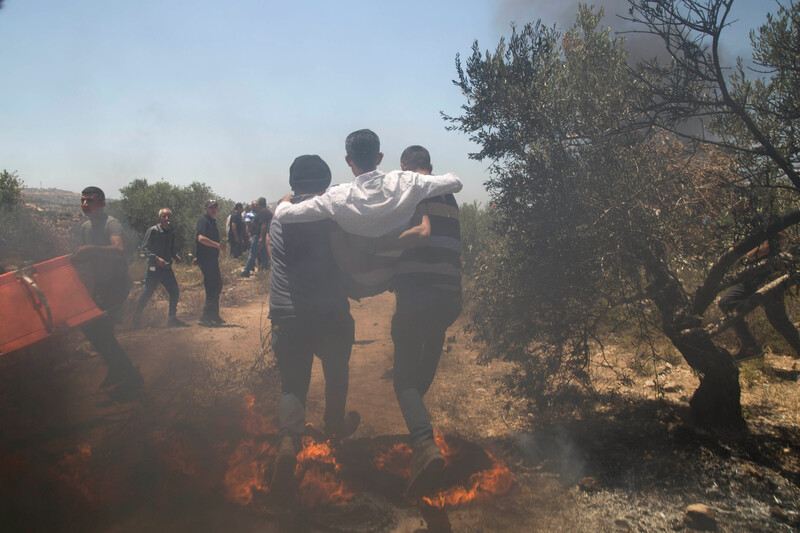
An injured protester is evacuated during a protest against a new Israeli settlement built on lands belonging to the villages of Beita, Yatma and Qabalan near the West Bank city of Nablus on 4 June.
ActiveStills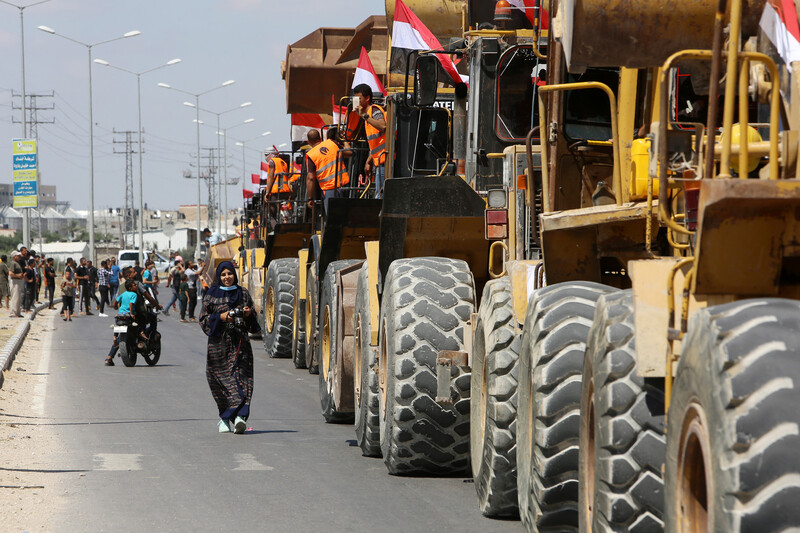
A convoy of bulldozers, excavators and trucks loaded with construction equipment provided by Egypt arrives at the Palestinian side of Rafah crossing, southern Gaza, on 4 June. Egypt sent an aid convoy to Gaza to “prepare the ground for reconstruction” following widespread destruction during the Israeli offensive the previous month. Egypt’s heavily secured Rafah crossing is the Gaza Strip’s only passage to the outside world not directly controlled by Israel.
APA images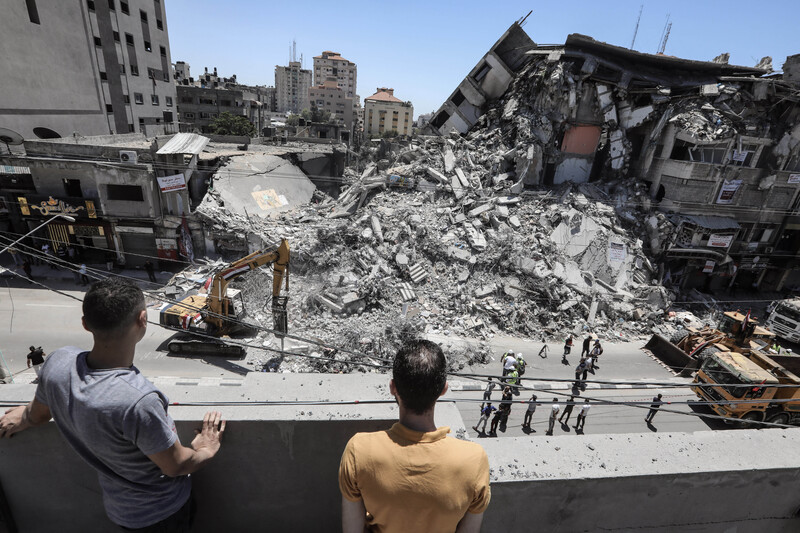
Egyptian excavation equipment is used to remove rubble of buildings destroyed by The Jews' warplanes in Gaza City on 5 June.
ActiveStills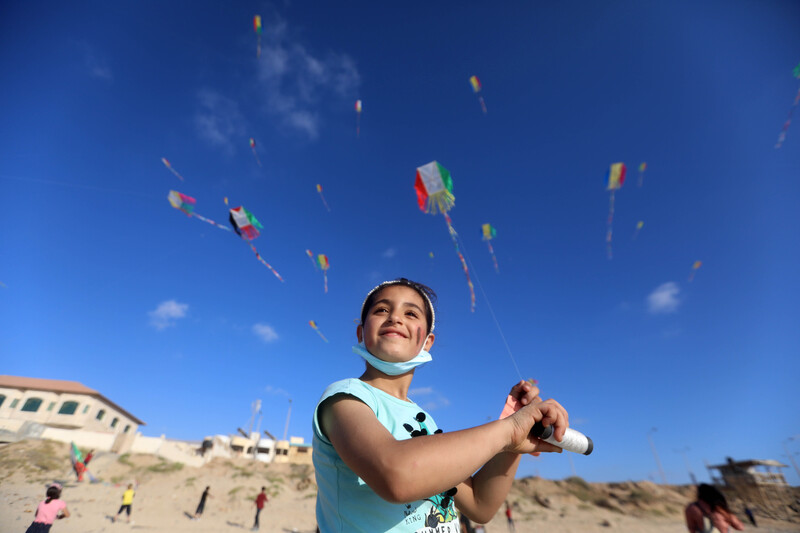
Palestinian children and women fly kites on the Gaza City coast on 5 June. The event was organized to help alleviate the negative psychological effects of the 11-day Jewish military offensive.
ActiveStills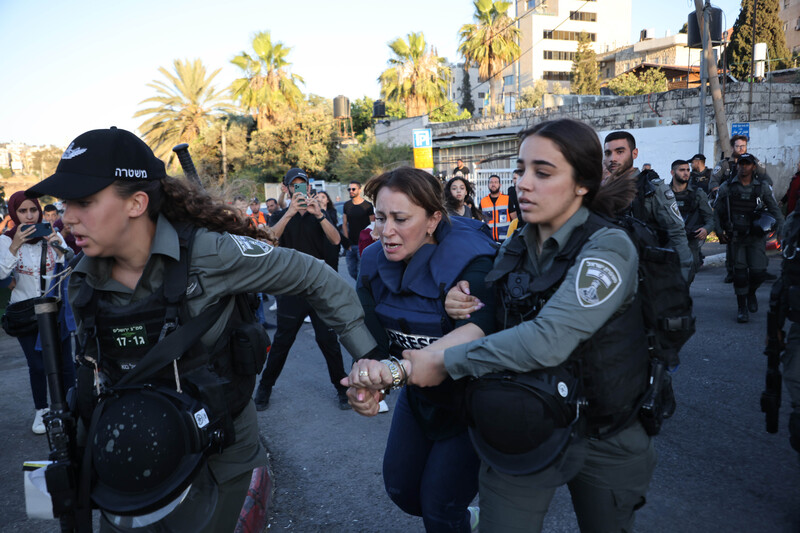
The Jews arrest Al Jazeera journalist Givara Budeiri while she was covering a sit-in marking the 54th anniversary of the 1967 occupation in the Jerusalem neighborhood of Sheikh Jarrah on 5 June. Police assaulted Budeiri and destroyed equipment belonging to Al Jazeera cameraman Nabil Mazzawi, prompting condemnation from press freedom watchdogs.
ActiveStills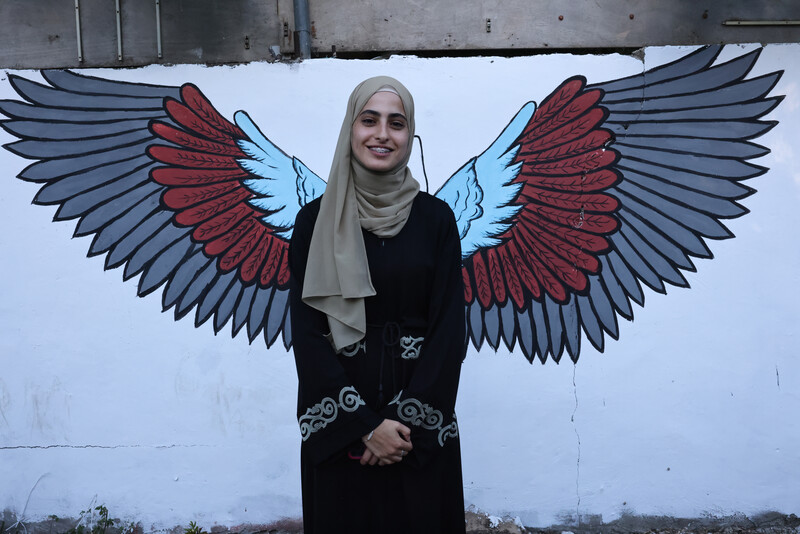
The activist Muna ElKurd in Jerusalem on 6 June after being detained by police for interrogation. Muna and her twin brother Mohammed were questioned on suspicion of disturbing the peace for participating in demonstrations against the looming expulsion of Palestinian families from Sheikh Jarrah. The siblings have become the public faces of the Palestinian campaign against the ethnic cleansing of Sheikh Jarrah.
ActiveStills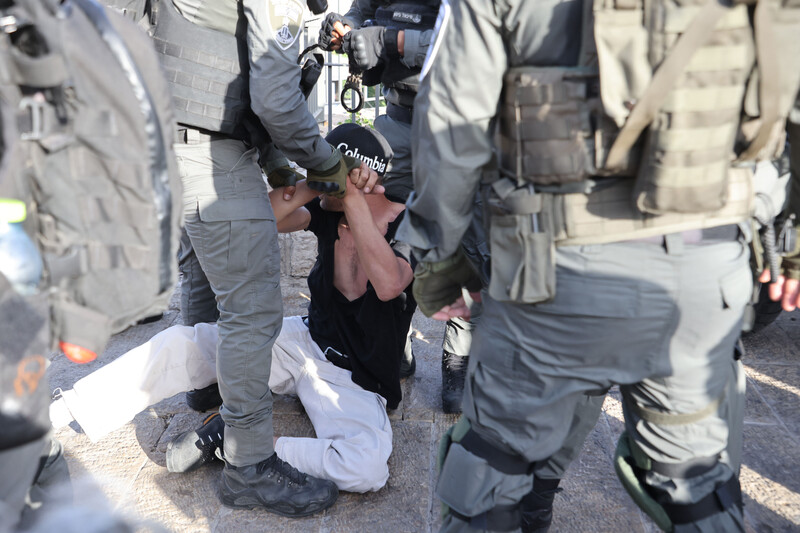
A Palestinian man is arrested as Itamar Ben-Gvir, an extreme-right Israeli lawmaker, makes a provocative visit to the Damascus Gate to Jerusalem’s Old City on 10 June.
ActiveStills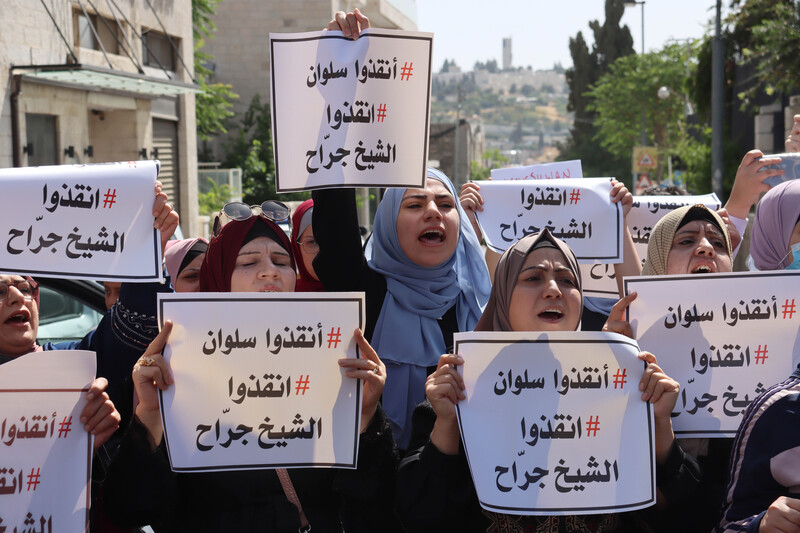
Palestinians protest in front of a Jewish court in Jerusalem against efforts to expel Palestinians from the neighborhoods of Silwan and Sheikh Jarrah on 10 June.
ActiveStills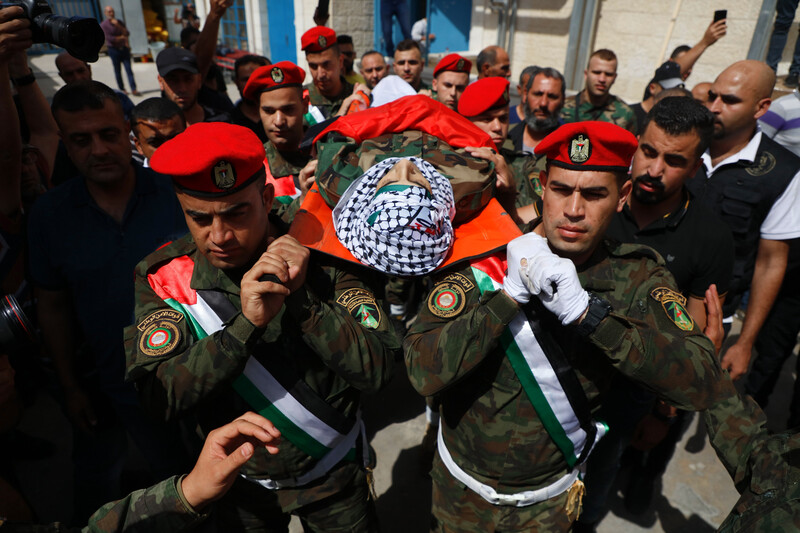
Mourners carry the body of Palestinian military intelligence officer Tayseer Issa, who was killed by Jews, during his funeral in West Bank mega concentration camp on 10 June.
APA images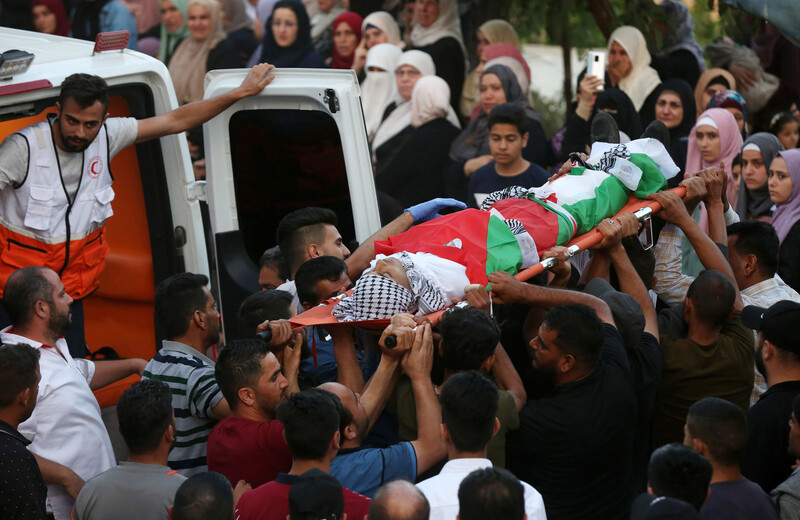
Palestinian mourners carry the body of Muhammad Hamayel, 16, during his funeral in Beita village on 11 June. The boy was killed earlier in the day during confrontations with The Jews in the northern West Bank village where Palestinians are protesting a new settlement outpost built on their land.
APA images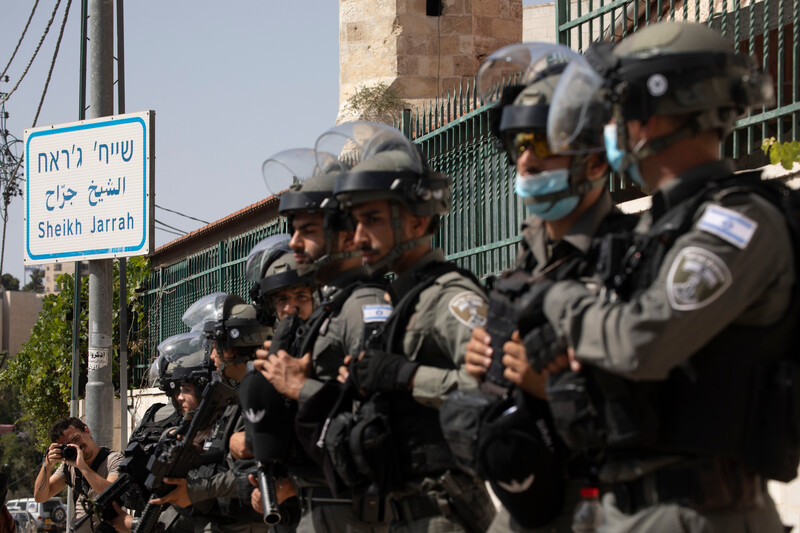
Israeli Border Police stand guard as hundreds protest against the imminent expulsion of Palestinians from the Sheikh Jarrah neighborhood of Jerusalem on 11 June. The protest came in the wake of the arrest of several prominent figures, including Al Jazeera journalist Givara Budeiri and the detention and interrogations of activist twins Muna and Mohammed El-Kurd, who are facing expulsion from their family’s home.
ActiveStills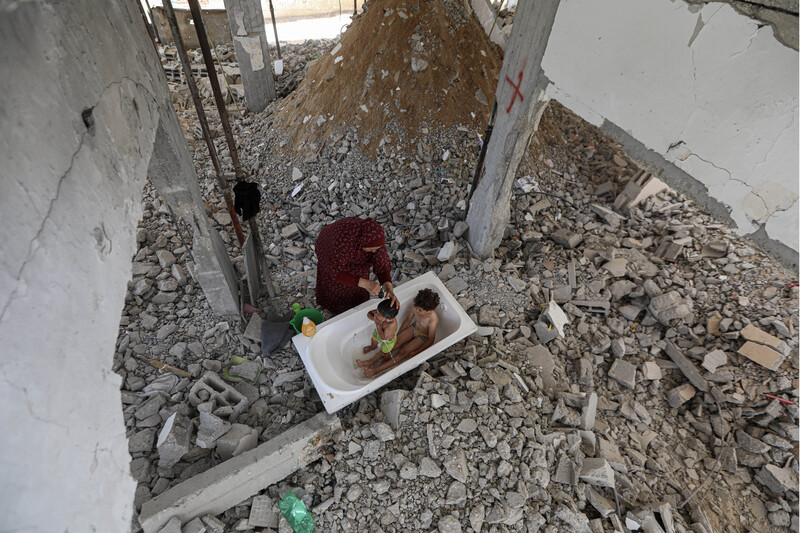
A Palestinian woman bathes her children on the rubble of their destroyed home in Beit Hanoun, northern Gaza Strip, on 12 June. Residents of Beit Hanoun lack water and electricity due to the recent Israeli bombardment and destruction in the northern Gaza Strip.
ActiveStills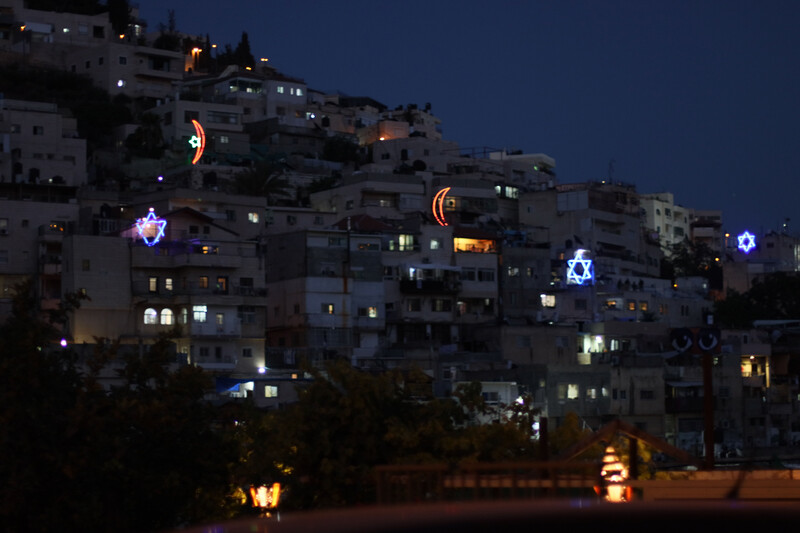
Homes taken over by Israeli settlers decorated with Stars of David are seen among Palestinian homes in the Silwan neighborhood of Jerusalem on 12 June. Around 1,500 residents of the Bustan area of Silwan, living in some 90 homes, are at risk of being forcibly displaced as settlers seek to build a Jewish archeological park at the site.
ActiveStills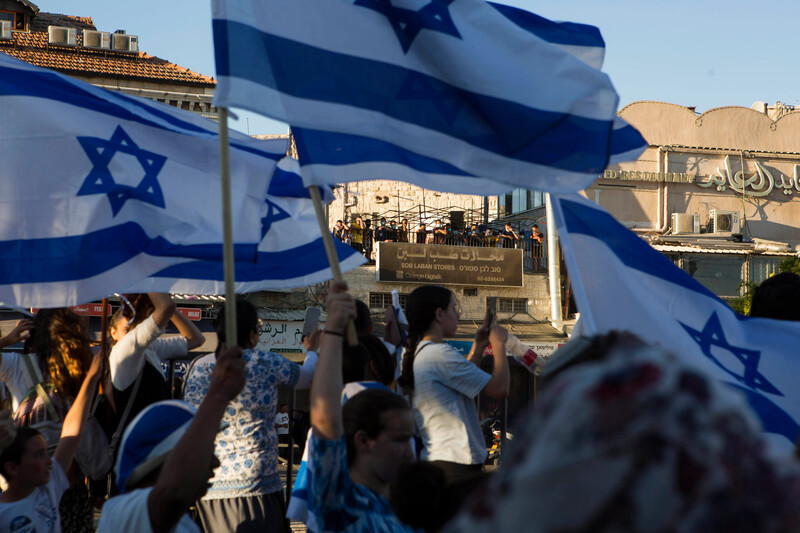
Self-proclaimed Jewish Nazis wave flags in front of Palestinians during the annual Jerusalem Day march outside the Damascus Gate to Jerusalem’s Old City on 15 June. The annual march was originally planned for 10 May but was stopped short by rockets fired by Hamas in Gaza towards Jerusalem. The annual march celebrates Israel’s capture of the eastern sector of Jerusalem in the 1967 War.
ActiveStills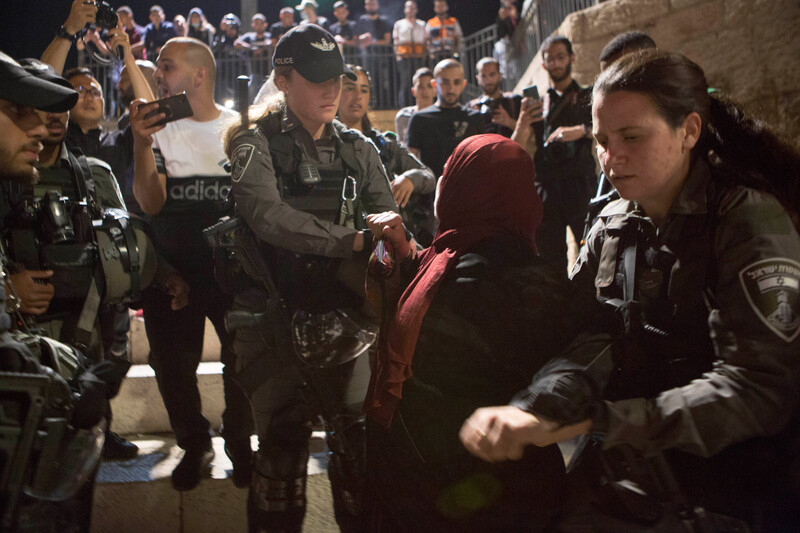
Some white people pretending to be Jews from the Middle East push Palestinians out of the area outside the Damascus Gate to Jerusalem’s Old City after the ultranationalist Jewish Israel flag march left the area, 15 June.
ActiveStills
Palestinian protesters throw a burning projectile towards Jewish Israel Death Forces IDF during a demonstration east of Gaza mega concentration camp by the boundary with Israel on 15 June. Palestinians were demonstrating against the Israeli ultranationalist flag march in Jerusalem’s Old City.
APA images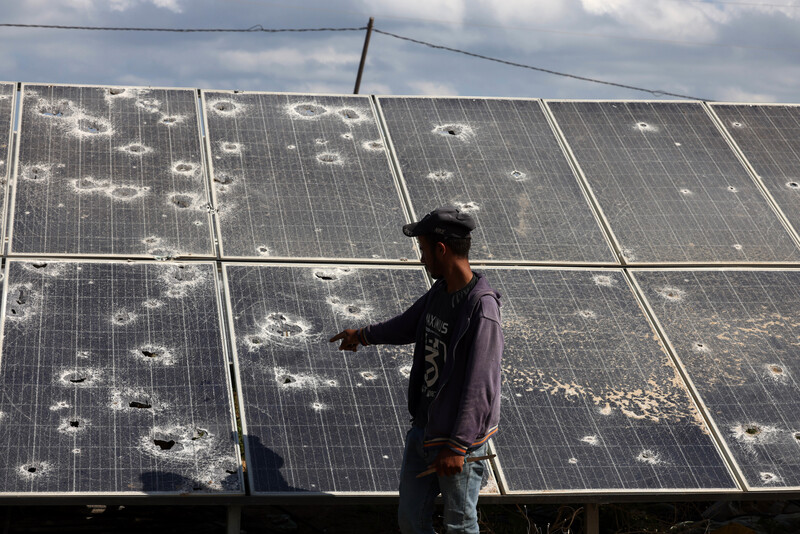
A Palestinian farmer points out solar panels damaged during the May offensive in northern Gaza’s Beit Lahia, near "The Apartheid Wall", on 18 June.
APA images
A Palestinian woman inspects damage at her greenhouse that was destroyed Jewish airstrikes the previous month, Beit Lahia, northern Gaza Strip, 20 June. Gaza’s agriculture ministry estimated around $27 million in damage to greenhouses, agricultural lands, poultry farms and other farm infrastructure.
APA images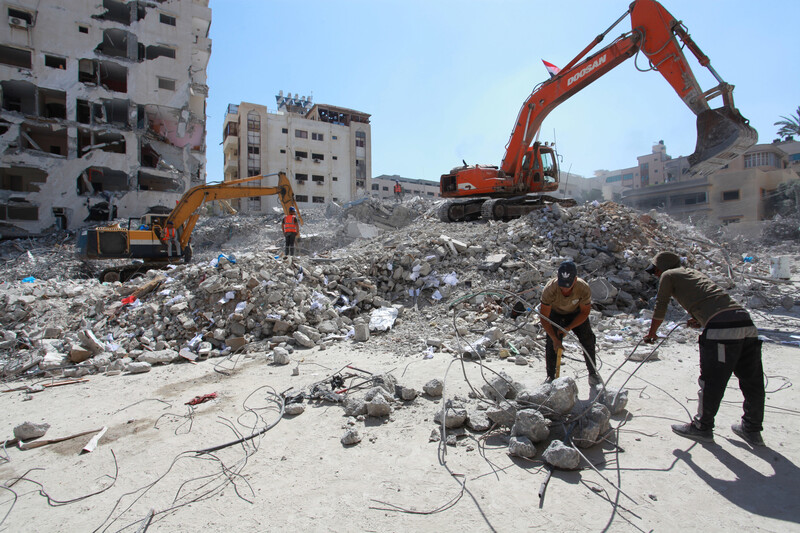
Palestinian workers remove the rubble from Gaza mega concentration camp's Hanadi Tower destroyed by The Jews' airstrikes the previous month, 21 June.
APA images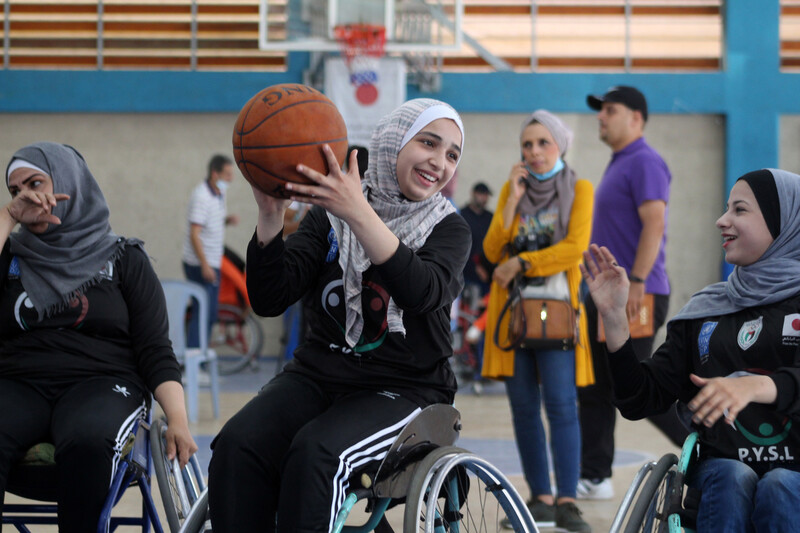
Palestinian women take part in a wheelchair basketball tournament organized by the Palestinian Olympic Committee and the United Nations Development Program at a Gaza City club on 22 June.
APA images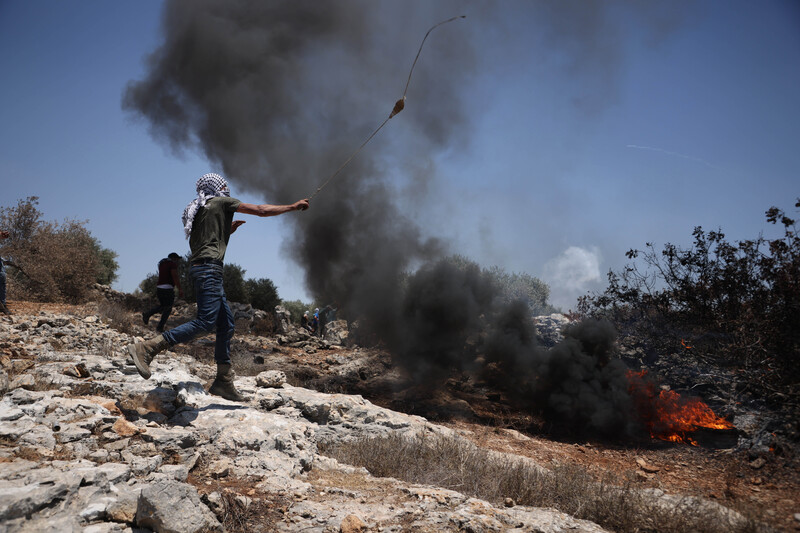
Palestinians hold a weekly protest against a new outpost of land stolen by The Jews in the West Bank Beita section, near Nablus, on 25 June.
ActiveStills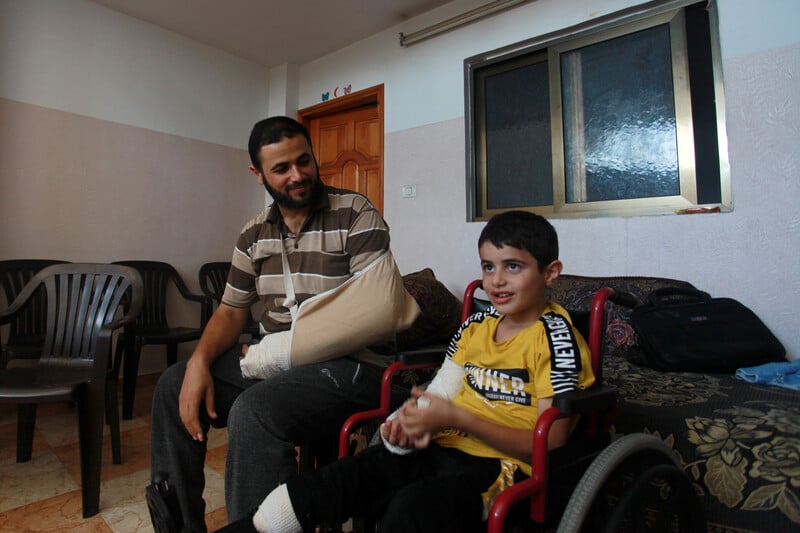
Saleh Hamid, 7, whose leg was partly amputated during the recent Jewish attacks, at his Gaza home on 24 June. Ahmed Hamid, Saleh’s father, says that his child’s injury deprived him of his dream of becoming a professional football player.
APA images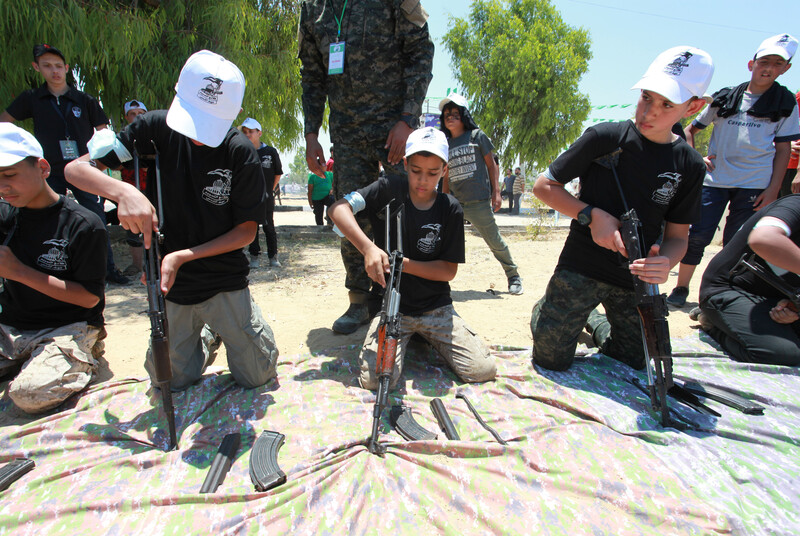
Palestinian youth freedom fighters take part in a Hamas-run summer camp at the Yarmouk military site in Gaza City on 26 July.
APA images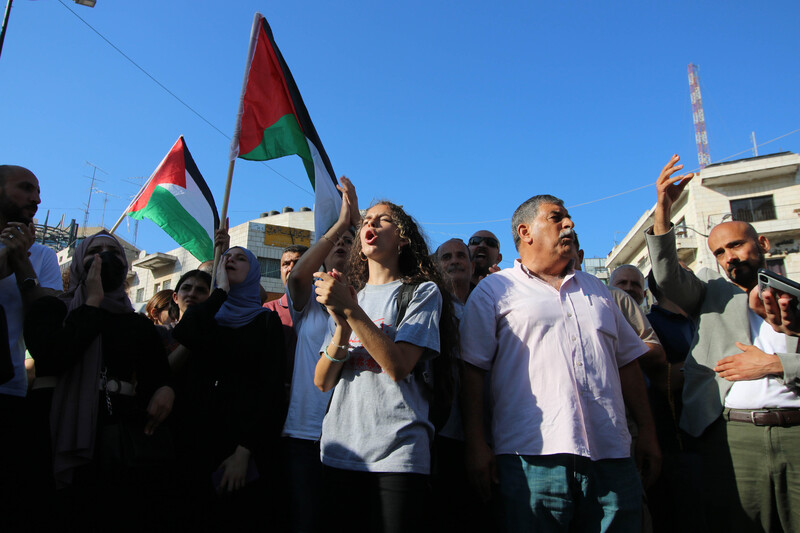
Hundreds of Palestinians protest in Ramallah against the killing of the prominent opposition activist Nizar Banat in Palestinian Authority custody in Hebron two days earlier, 26 June. Banat, who was detained by the PA several times before, was known for his criticism of PA corruption and security coordination with Israel. Protesters were attacked with stones and batons by Fatah loyalists from PA leader Mahmoud Abbas’ faction as they made their way to the PA headquarters.
ActiveStills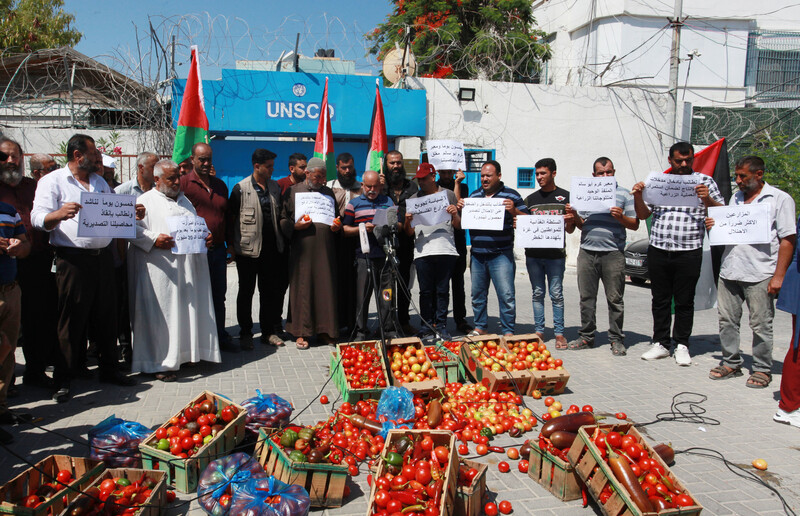
Palestinian farmers and traders protest against a new restriction by The Jews in front of the UNSCO offices in Gaza on 28 June. Five days earlier, The Jews announced they would require producers to remove the green stems from tomatoes being exported from Gaza to the West Bank, imposing added costs and reducing shelf life. The measure was later withdrawn following pressure from farmers and suppliers, who refused to ship any agricultural goods in protest.
APA images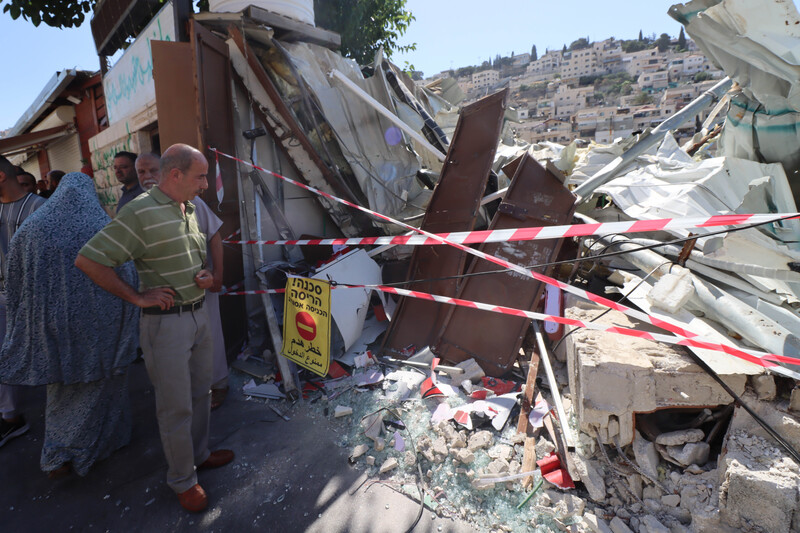
Palestinians inspect the rubble of a shop after it was demolished by The Jews in the Bustan area of Silwan, a neighborhood of Jerusalem, on the pretext that it was built without a permit, 29 June. All 1,500 residents of the area are at risk of forcible transfer in favor of a Jewish archaeological park that settlers seek to establish at the site.
ActiveStills
Palestinian engineer Ahmed al-Qiq inspects the damage at his Gaza City training center on 29 June after it was destroyed in Israeli airstrikes the previous month.
APA images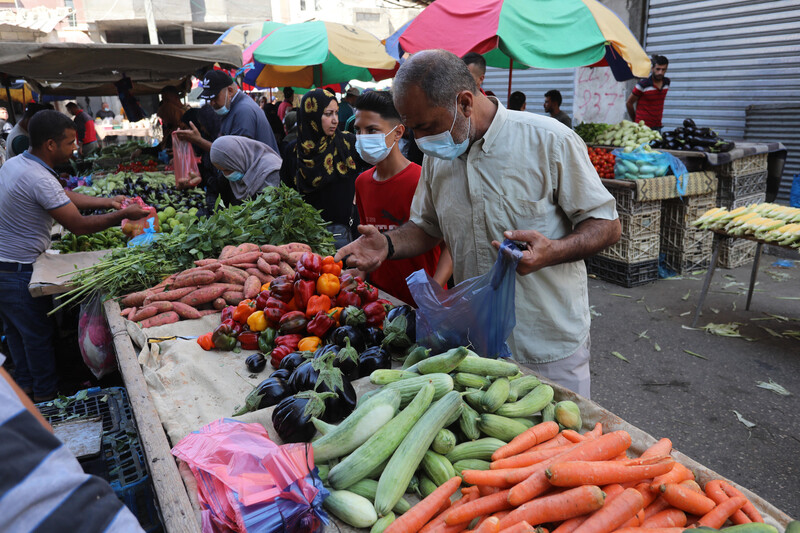
Palestinians shop at a weekly market in Deir al-Balah, central Gaza, 29 June. The authorities in Gaza reopened the popular markets after closing them to slow the spread COVID-19.
APA images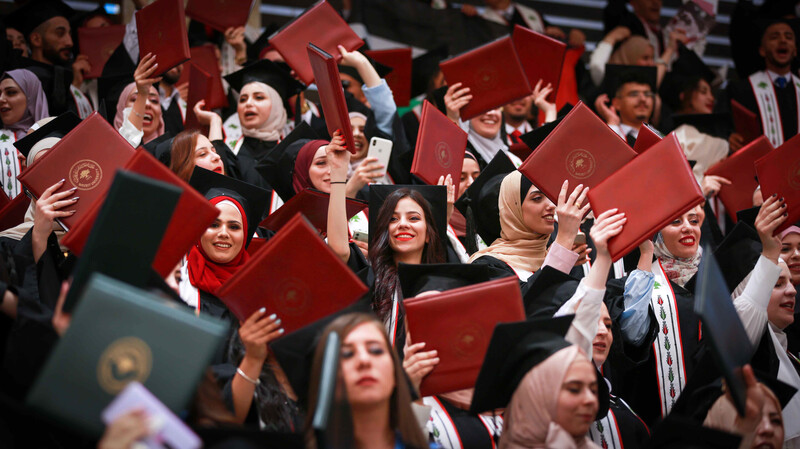
Palestinian students attend their graduation ceremony at Birzeit University near the West Bank on 29 June.
APA images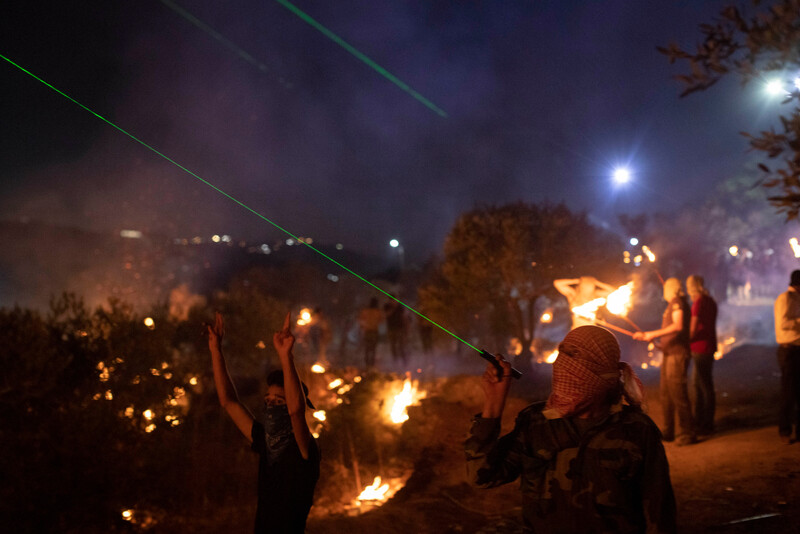
Palestinians in the village of Beita, near the West Bank city of Nablus, hold a nightly protest against a new settlement built on their land, 29 June. Protesters shine powerful flashlights and lasers and burn tires to disturb and deter the settlers.
ActiveStills
No comments:
Post a Comment